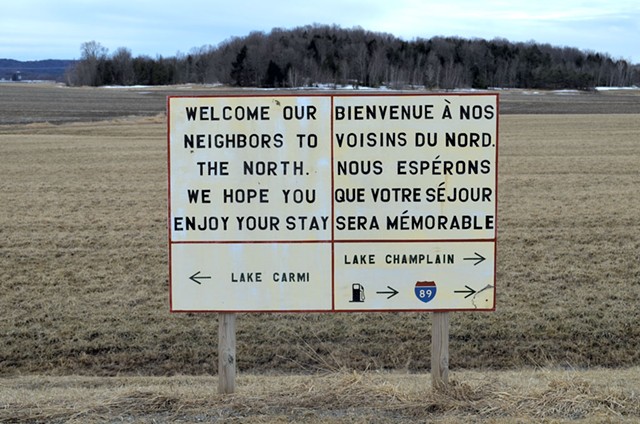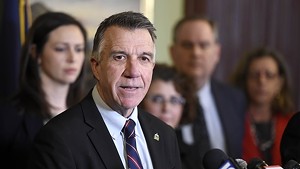
- File: Mark Davis
- A sign near the border
A federal immigration agency will furlough more than 1,100 Vermonters next month in response to a looming budget deficit, according to Sen. Patrick Leahy (D-Vt.), who implored his colleagues Wednesday afternoon to pass a new relief bill that could prevent the temporary job losses.
"These are men and women who day after day do important work for the nation," Leahy said in remarks from the Senate floor. "They've continued to do that work every day even during the COVID-19 pandemic. And even though they've been doing the work loyally and effectively, after August 3rd, they can no longer do their job; they no longer will receive a paycheck."
The U.S. Citizenship and Immigration Services has more than 19,000 employees whose main tasks include processing requests for asylum, immigration benefits and American citizenship. Vermont hosts one of the nation's five USCIS service centers, with 1,700 workers located mainly in Essex and St. Albans.
The agency had warned for weeks that it would need to furlough employees in response to the pandemic, but it had not confirmed exactly how many Vermonters would be impacted. That revelation came last Friday, when the agency sent furlough notices to 13,350 of its employees, 1,111 of whom are Vermont workers, Leahy said.
The furloughs will hit the state at a time when it has been working to restart sectors of its economy after a weeks-long shutdown forced tens of thousands of people to seek unemployment.
Gov. Phil Scott has fielded questions about potential USCIS furloughs in recent weeks, saying as recently as Monday that he was still unaware of the local impact. Two days later, he seemed taken aback when informed about the reported number of cuts.
"We'll check this out," he said at Wednesday's press briefing. "I hadn't heard that number. I would be surprised if it was that high."
If Leahy's number is indeed accurate, it would be yet "another blow to our economy," Scott said, noting that Vermont is still trying to get at least 40,000 people back to work.
"We'll do everything we can to assist these people," he said.
Seven Days obtained a letter sent to one of the Vermont USCIS workers last week that says the agency expects the furloughs to last between one and three months.
"At this time, we do not reasonably anticipate the need for a furlough of 90 days or more," the letter says. "However, should additional furlough days be necessary, you will be issued another notice."
The agency, which is funded through fee payments, has suffered during the coronavirus pandemic. Border closures have ceased all but nonessential travel between the U.S. and its two neighboring nations, and a wave of new coronavirus cases across North America has left some fearful that the restrictions will be extended into the fall.
The agency has been working on a new fee schedule that would help it recover some lost revenue, according to the furlough notice sent to the Vermont worker.
"To address our fiscal situation during these uncertain times, we have also taken measures to tighten our budget across the board while upholding our mission," the letter says. "Unfortunately, the measures we have taken are not enough at this time."
Earlier this month, agency officials requested a $1.2 billion appropriation from Congress to cover the losses.
Leahy, who sits on the powerful Senate Appropriations Committee, acknowledged the pandemic's impact. But he argued that the agency's challenges trace back far further than the arrival of COVID-19. He said USCIS has routinely overspent its budget during the Trump presidency, and the administration's "mismanagement and extreme immigration policies" have only worsened the problem.
"As part of the president’s efforts to erase our identity as a nation of immigrants, he has not just tried to shut our nation’s doors to asylum seekers and refugees; he's attempted to restrict almost all immigration to this country," Leahy continued. "He’s created obstacles for immigrant workers, created a 'wealth test' for immigrants, even exploited the current public health emergency to impose additional immigration restrictions that have nothing to do with public health."
Leahy said the furloughs would hurt not only thousands of federal employees and contractors but also the communities in which they live and work. In Vermont, the cuts would reduce the USCIS workforce by two-thirds, he said.
Leahy and other Democrats have urged the Senate to take up a new coronavirus relief bill that could address the immigration agency's challenges and many others. He blamed the White House and the Senate's Republican majority for ignoring the alarm bells and said lawmakers have a duty to "solve this problem" before furloughs are necessary.
"Nationwide, these are 13,350 new and urgent reasons why the Senate must act on our nation's real and immediate needs, and the Senate majority must make that possible now," he said. He later added: "Time is of the essence."
News of the exact number of furloughs came on the same day that the Scott administration outlined guidance for a grant program that will provide ailing businesses cash from Vermont's share of the federal COVID-19 relief funds.
The program, which was
first proposed by Scott and
later amended by the legislature, represents an initial wave of money to come from the more than
$150 million in business grants lawmakers approved before adjourning last week.
The Department of Taxes will hand out $50 million to businesses that pay rooms and meals taxes, such as restaurants and hotels. The Agency of Commerce and Community Development will distribute $20 million to all other businesses. A second wave of money — $82 million — will be freed up once Scott signs another relief bill that the legislature passed last Friday night.
Businesses can start applying for the program July 6 and will receive grants on a first-come, first-served basis. To be eligible, they must be open or certify that they intend to reopen once COVID-19-related restrictions are lifted. They must also have experienced a 75 percent reduction in sales or revenue during any one-month period between March and September, compared with that same period in 2019.
The state will calculate grant totals by taking a business' gross annual sales or revenue and multiplying that by 10 percent. Grants will max out at $50,000, and businesses can only receive one.
"Even though this economic relief will help, I know it's not enough, and recovery will be long and hard," Scott said. "But we've seen the strength of Vermonters and what a powerful impact we have when we stick together.
"Please know that my team and I will continue to turn every knob, pull every lever we can, to help families and businesses survive and recover from this crisis, so we can thrive in the future," the governor continued.



















Comments
Comments are closed.
From 2014-2020, Seven Days allowed readers to comment on all stories posted on our website. While we've appreciated the suggestions and insights, right now Seven Days is prioritizing our core mission — producing high-quality, responsible local journalism — over moderating online debates between readers.
To criticize, correct or praise our reporting, please send us a letter to the editor or send us a tip. We’ll check it out and report the results.
Online comments may return when we have better tech tools for managing them. Thanks for reading.